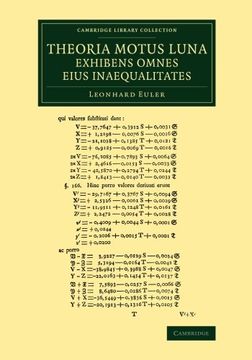Share
Theoria Motus Lunae Exhibens Omnes Eius Inaequalitates: In Additamento hoc Idem Argumentum Aliter Tractatur Simulque Ostenditur Quemadmodum Motus Luna (Cambridge Library Collection - Astronomy)
Leonhard Euler (Author)
·
Cambridge University Press
· Paperback
Theoria Motus Lunae Exhibens Omnes Eius Inaequalitates: In Additamento hoc Idem Argumentum Aliter Tractatur Simulque Ostenditur Quemadmodum Motus Luna (Cambridge Library Collection - Astronomy) - Leonhard Euler
Choose the list to add your product or create one New List
✓ Product added successfully to the Wishlist.
Go to My Wishlists
Origin: Spain
(Import costs included in the price)
It will be shipped from our warehouse between
Thursday, May 23 and
Monday, June 03.
You will receive it anywhere in United Kingdom between 1 and 3 business days after shipment.
Synopsis "Theoria Motus Lunae Exhibens Omnes Eius Inaequalitates: In Additamento hoc Idem Argumentum Aliter Tractatur Simulque Ostenditur Quemadmodum Motus Luna (Cambridge Library Collection - Astronomy)"
The problem of the moon's orbit was one that Leonhard Euler (1707–83) returned to repeatedly throughout his life. It provided a testing ground for Newton's theory of gravitation. Could the motion of the moon be entirely accounted for by Newton's theory? Or, as Euler initially suspected, did other forces need to be invoked? For practical purposes, if the moon's orbit could be accurately predicted, its motion would provide the universal timekeeper required to solve the longitude problem. In addition to the mathematical 'three-body problem', a topic still under investigation today, Euler was faced with the statistical problem of reconciling observations rendered inconsistent by experimental error. The present work, published in Latin in 1753, is Euler's triumphant solution. It may not be the last word on a subject which has occupied mathematicians and astronomers for over three centuries, but it showed that Newton's laws were sufficient to explain lunar motion.
- 0% (0)
- 0% (0)
- 0% (0)
- 0% (0)
- 0% (0)
All books in our catalog are Original.
The book is written in English.
The binding of this edition is Paperback.
✓ Producto agregado correctamente al carro, Ir a Pagar.

